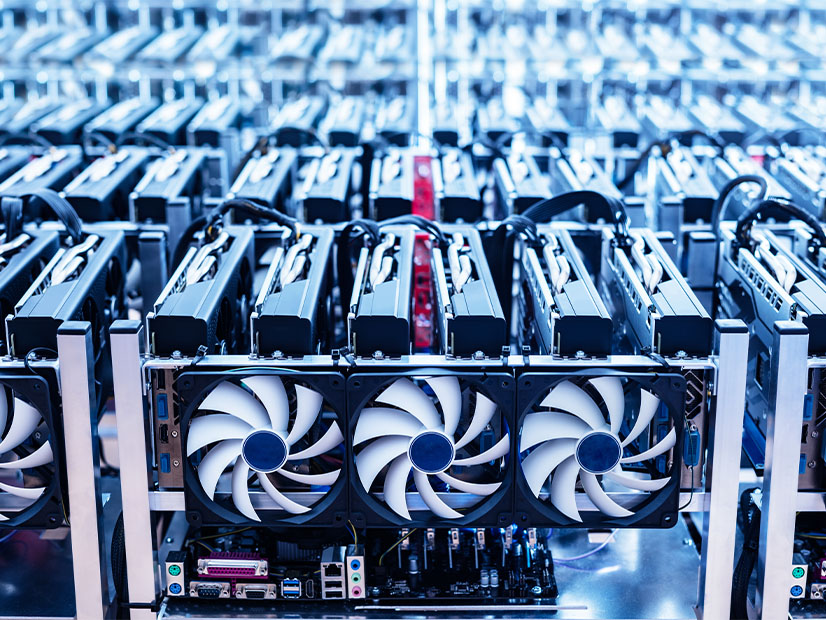
Three bills that passed the New York legislature last week in the final hours of its session seek to embed the state’s climate law into decision-making processes for certain cryptocurrency mining operations and heating and cooling for buildings.
Here’s a look at what the bills will achieve if Gov. Kathy Hochul chooses to sign them.
Building Codes
The Advanced Building Codes, Appliance and Equipment Efficiency Standards Act (A10439) would strengthen New York’s appliance efficiency standards and align the state’s building codes with the Climate Leadership and Community Protection Act (CLCPA). The bill would update the state’s energy law to go beyond merely encouraging the conservation of energy to promoting the “clean energy and climate agenda,” which includes reducing greenhouse gas emissions in new and rehabilitated buildings.
Application of the bill’s measures would save consumers $15 billion in utility costs by 2035, of which $6 billion is in low- to moderate-income households, according to the legislature’s bill analysis.
The Natural Resources Defense Council called passage of the bill a “big win for New Yorkers.”
“The legislation will result in a reduction of GHG emissions of 17 million tons, which is comparable to taking more than 3.5 million cars off the road for a year,” Samantha Wilt, senior policy analyst for NRDC’s climate and clean energy program, said in a statement.
A new definition of life-cycle cost in the bill would guide regulators’ consideration of the cost-effectiveness of potential amendments to the state energy conservation construction code. Regulators would be required to consider the estimated cost of acquisition, operation, maintenance and construction of an energy system over the life of a building, with specific attention to cost of fuel, among other things.
The bill also would ensure that efficiency standards and regulations do not increase emission of co-pollutants, such as sulfur dioxide and nitrogen oxides, or burden disadvantaged communities.
All provisions of the bill would take effect within six months of enactment.
Thermal Networks
The Utility Thermal Energy Network and Jobs Act (S9422) would change the definition of New York’s electric and gas utilities so they can own and operate thermal energy networks and supply thermal energy to consumers. It would also direct the Public Service Commission to initiate a proceeding within three months of the bill’s enactment to advance development of thermal networks to meet the GHG emissions and equity goals of the CLCPA.
Utilities would have three months from enactment to propose at least one, and up to five, thermal network pilot projects, ensuring at least one pilot per territory is within a disadvantaged community.
Thermal energy, as defined in the bill, refers to piped, noncombustible fluids that transfer heat in and out of a building to eliminate GHG emissions of heating and cooling processes. A thermal network would be defined as the infrastructure that supports a utility-scale project that supplies thermal energy.
Another provision of the bill seeks to support utility workers potentially affected by the downsizing of the gas system, with a priority placed on their transition for the operations and maintenance of thermal networks.
The Building Decarbonization Coalition, together with a group of union organizations and climate advocates, applauded passage of the act and called on Hochul to “act quickly” to sign the bill. The bill would take effect immediately.
Crypto Mining
A bill (A07389) that would amend New York’s environmental conservation law seeks to place a temporary moratorium on cryptocurrency mining operations that use an authentication method called proof-of-work (PoW) to validate blockchain transactions.
The PoW method uses substantial amounts of energy because of the high level of computations necessary for the process. Large cryptocurrency mining operations have sprung up around the PoW methodology, including some in New York, and the increase has prompted concerns about the associated energy use potentially preventing the state from meeting its GHG emission reduction targets.
Annual global energy use for PoW authentication is equivalent to that of Sweden, according to the legislature’s bill analysis.
For two years from the bill’s enactment, New York environmental regulators would not be able to issue an air permit to a fossil fuel-fired power plant that provides electricity for PoW cryptocurrency mining. They also would not be able to renew an air permit for a facility that plans to increase electricity supply for PoW mining.
To help the state understand the effects of PoW mining on energy use and the environment, the Department of Environmental Conservation would develop a generic environmental impact statement for the cryptocurrency operations in the state.
While environmental advocates applauded passage of the legislation, the Blockchain Association called it “misguided” in a tweet Friday. “We encourage all pro-tech New Yorkers to make their voices heard and ask the governor to veto” the bill, it said.
